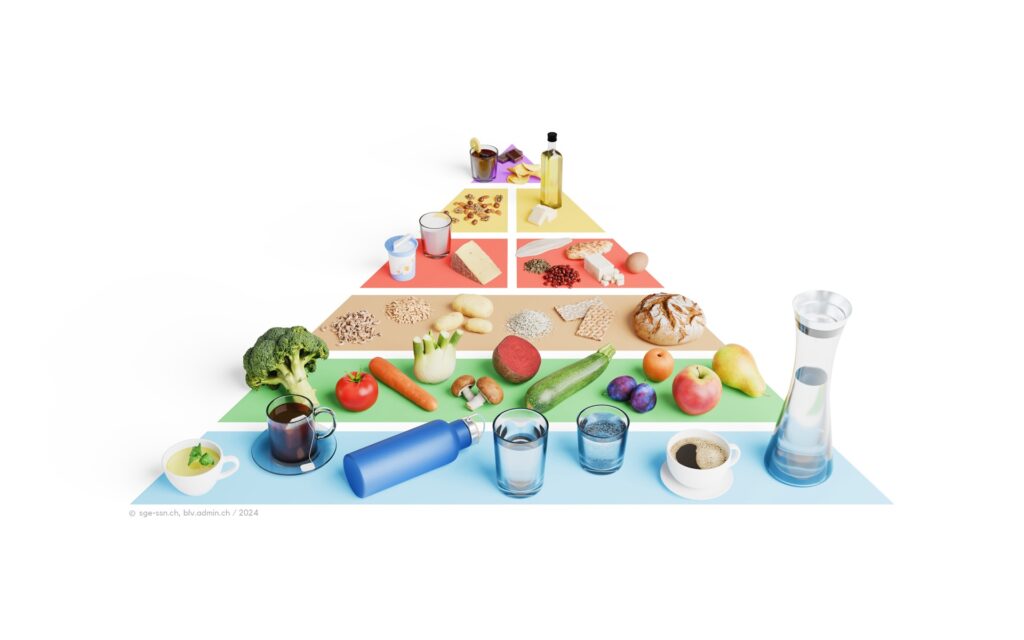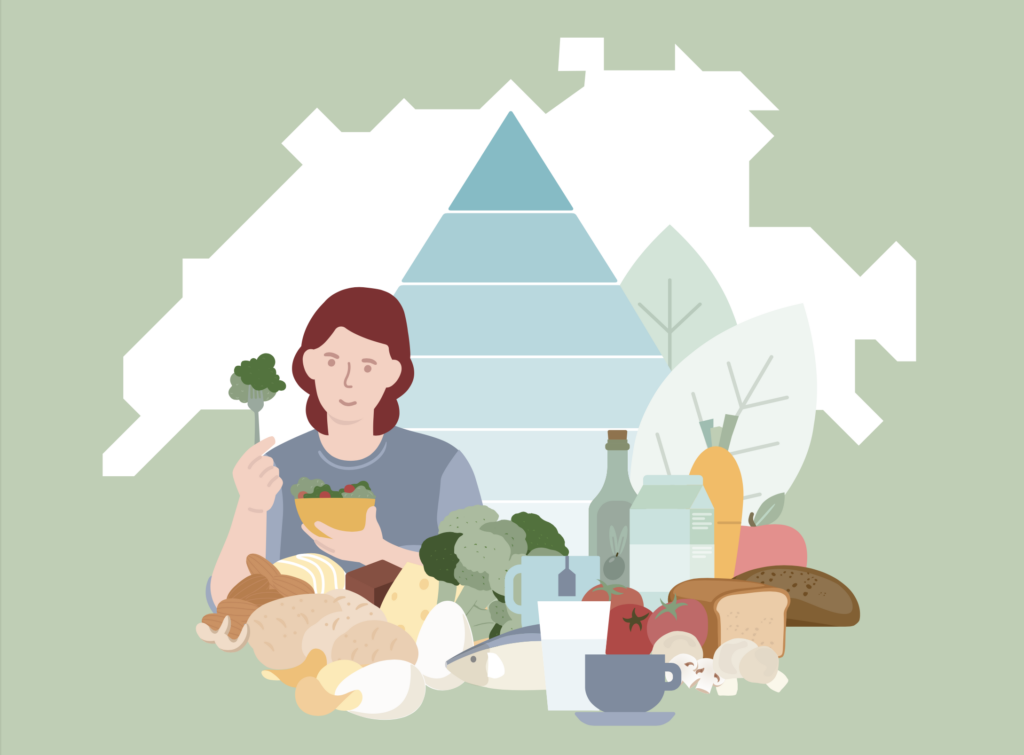5 Mins Read
The Swiss government has published its nutrition strategy for the next eight years, expanding the focus to sustainability, plant-based diets and food waste.
Swiss citizens are eating too much meat, animal fat, sugar and salt, and very few fruits, vegetables, nuts and legumes. With diet-related diseases and greenhouse gas emissions on the rise, their consumption habits need an overhaul, according to the government.
The Food Safety and Veterinary Office (FSVO) has published the country’s latest nutrition strategy for 2025-32, spotlighting plant-based diets, food waste reduction, and sustainability as core goals, in addition to balanced eating and greater nutritional literacy.
“The new nutrition strategy is broader in scope than the old one,” said Élisabeth Baume-Schneider, a member of the Federal Council and head of home affairs. It’s no longer based exclusively on the National Strategy for the Prevention of Non-Communicable Diseases – it now integrates sustainability-led approaches, including the national climate and agriculture goals for 2050, and the food waste action plan.
“This holistic perspective is essential to strengthening the effectiveness of the Swiss nutrition strategy. It also requires close cooperation between the relevant federal agencies, stakeholders from the nutrition and food sector, as well as science and civil society,” explained Baume-Schnieder.
“We welcome the progressive approach taken by the Swiss government to ensure that plant-rich diets are prioritised in its nutrition strategy,” Soizic Larcher, EU policy officer for ProVeg International, told Green Queen. “There is a growing trend to integrate sustainability considerations in national dietary recommendations, and Switzerland is one of several countries leading by example.”
Why Switzerland needed a new nutrition strategy

Around a quarter of the Swiss population (2.2 million) suffers from a non-communicable disease, and that share is rising. A major factor is diet, with current eating patterns skewed towards animal products and unhealthy foods high in salt, sugar, and fat. Meanwhile, 15% of the country’s children and teenagers are overweight or obese, rising to 43% of adults (up from 30% three decades ago).
At the same time, the food system accounts for a quarter of Switzerland’s emissions, and food waste itself is responsible for a quarter of that impact. The nation produces 2.8 million tonnes of avoidable food waste annually, or about 330kg per person.
The national strategy to tackle this issue aims to halve food waste by 2030 (from a 2017 baseline), which would lower agrifood emissions by 10-15%.
Switzerland’s nutrition plan for the next eight years takes all of this into account, with the hope that it “strengthens healthy food supply, reduces the ecological footprint, and supports research in the areas of nutrition and food”, noted Baume-Schneider.
The strategy has six key objectives: promote a balanced and healthy diet with sufficient nutrient intake, boost nutritional literacy, strengthen plant-based nutrition, involve all food industry actors, create healthy and sustainable food environments, and reduce food waste.
The focus on plant-based builds on the country’s latest dietary guidelines for adults, published last August, which recommend eating more whole foods and plant proteins. It’s a trend occurring in more and more countries, including Canada, Germany, Austria, Norway, Finland, and potentially even the US.
“We believe that more countries will follow suit as the evidence continues to build, showing the health advantages of a plant-based diet as well as the environmental benefits,” said Larcher.
Swiss consumers are already eating less meat and dairy – thanks to a large flexitarian population – with mushrooms, vegetables and legumes gaining popularity. Plant-based meat alternatives, however, only attract 15% of flexitarians, behind proteins like tofu and tempeh (21%). That said, environment and health are the largest dietary drivers for these consumers.
Switzerland to create an action plan to implement nutrition strategy

While the nutrition strategy is a good first step, how it will be implemented is more important. The FSVO will develop an action plan with measurable goals by the end of this year to show how it plans to effect these changes.
Covering a period between 2025 and 2028, this plan will contain measurable goals across four areas. The first area is information and education to help the Swiss connect health, nutrition and sustainability. This involves further publicising the dietary guidelines, reducing household food waste, training teachers and caregivers on nutrition, and promoting healthy and sustainable diets in schools.
The government notes that food composition, advertising, and availability all impact eating habits, and politicians and businesses share equal responsibility in promoting the right food environment. So it is important to promote healthy and sustainable catering, reduce salt and sugar in processed products, create clear food labelling, and restrict food advertising aimed at children.
Coordination between the federal government, cantons, cities and the food industry needs to be expanded too. Pooling resources will help create the necessary structures for a future-oriented nutrition policy that serves both the people and the planet. The country should more actively participate in international networks like the World Health Organization, the European Food Safety Authority (EFSA), and more.
Finally, since an effective nutrition strategy is based on scientific principles, supporting research is key. As part of this, the federal government will collect additional data on nutrition and food to be made available to researchers and the public, monitor the nutritional behaviour of both adults and children, and fund studies to develop and test effective measures to promote healthy diets.
“The science is clear – and while the government’s upcoming action plan might shape important steps on education, regulation, and collaboration, the real test will be in how boldly it’s implemented,” said Pascal Bieri, co-founder of Swiss vegan leader Planted.
He called for public procurement measures in schools and hospitals to reflect the strategy, fair market conditions for all protein sources (“not just the ones with the most expensive lobby”), and educational resources to help the Swiss make better choices “without shame or complexity”. “The policy is slowly catching up,” he noted. “Now it’s time for implementation that’s focused on real impact – not just optics.”



